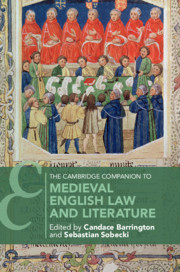Book contents
- The Cambridge Companion to Medieval English Law and Literature
- The Cambridge Companion to Medieval English Law and Literature
- Copyright page
- Contents
- Illustrations
- Contributors
- Abbreviations
- Preface
- Part I Legal Contexts
- Part II Literary Texts
- 7 Treason
- 8 Complaint Literature
- 9 Political Literature and Political Law
- 10 William Langland
- 11 Geoffrey Chaucer
- 12 John Gower
- 13 Lollards and Religious Writings
- 14 Lancastrian Literature
- 15 Middle English Romance and Malory’s Morte Darthur
- 16 Marriage and the Legal Culture of Witnessing
- Index
- References
11 - Geoffrey Chaucer
from Part II - Literary Texts
Published online by Cambridge University Press: 26 July 2019
- The Cambridge Companion to Medieval English Law and Literature
- The Cambridge Companion to Medieval English Law and Literature
- Copyright page
- Contents
- Illustrations
- Contributors
- Abbreviations
- Preface
- Part I Legal Contexts
- Part II Literary Texts
- 7 Treason
- 8 Complaint Literature
- 9 Political Literature and Political Law
- 10 William Langland
- 11 Geoffrey Chaucer
- 12 John Gower
- 13 Lollards and Religious Writings
- 14 Lancastrian Literature
- 15 Middle English Romance and Malory’s Morte Darthur
- 16 Marriage and the Legal Culture of Witnessing
- Index
- References
Summary
The extent of Chaucer’s direct involvement with legal practice has been an open question since the fifteenth century. Although a practical knowledge of both the law and legal procedure was expected of London’s citizens, details from Chaucer’s life-records and his ease with legal terminology and protocol would seem to associate him closely with the courts, though in ways broader and less reliant on institutional credentialing than experienced by the many legal professionals he encountered in his dealings. Beyond Thomas Speght’s observation in the biographical note prefacing his 1598 Workes of Chaucer that ‘It seemeth that [Chaucer was] of the inner Temple’ (a note based on an already-lost document noted by Speght’s contemporary, William Buckley), we have no evidence substantiating Chaucer’s connection to formal legal studies. Instead, we can understand his legal knowledge through a mass of extant records, now assembled in the Chaucer Life-Records, consisting ‘largely of legal documents: records of expenses, exchequer writs, payments of annuities, appointments to office, witness statements, pleas of debt, house leases’. Rather than record his career, they witness his multiple and lifelong transactions within England’s legal systems. In fact, because we have no record of Chaucer’s life as a poet, these legal documents provide the primary window into his biography.
- Type
- Chapter
- Information
- The Cambridge Companion to Medieval English Law and Literature , pp. 135 - 147Publisher: Cambridge University PressPrint publication year: 2019

